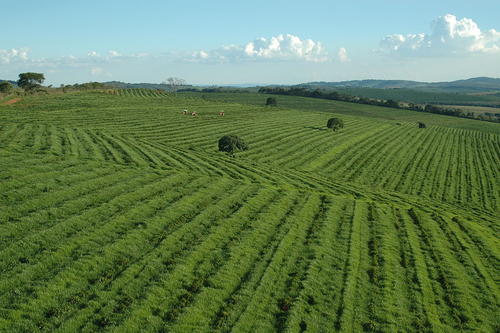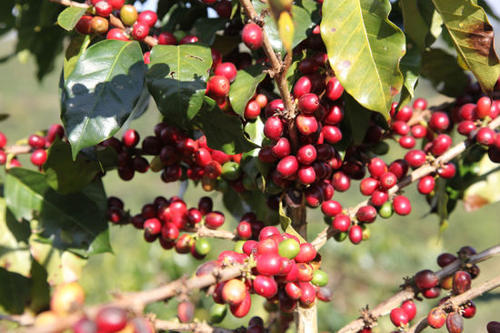Brazil domestic coffee consumption growth 2021/22 Brazil coffee bean production insufficient demand
According to the latest news released by Brazilian consultancy Safras & Mercado, the humidity in Brazil's coffee-growing areas was very high in early March, which means that the crisis of drought and lack of rain in Brazil last year has been lifted, and Brazilian coffee-growing areas have resumed operation. Safras expects Brazil's total coffee production this year to fall by 17% compared with the same period last year, with a total output of only about 57.1 million bags, exports are also lower than the previous season, and total exports are expected to be less than 60 million bags.

Brazil, as the world's largest coffee producer and exporter, the production reduction in this quarter will have an impact not only on Brazil's own coffee supply chain, but even on the global coffee supply chain.
As of March 9, 2021, Brazilian farmers had sold 87 per cent of 2020 Coffee beans in the new season, an increase of 4 per cent over the previous month, according to SAFRAS's monthly survey. The market has also maintained a stable sales volume, and sales are almost in line with the same period last year. In addition, sales of Arabica coffee in Brazil's 2020amp 21 season are rising from a historical average of 85% in the same period last year to 86% of expected production.

Safras & Mercado predicts that Arabica coffee production is expected to fall by 30% in the 22nd season of 2021, while Robusta is expected to increase production by 18%. At the same time, data show that Brazil's domestic consumption of freshly ground coffee has also increased by 1.26% over previous years, to 20.2 million bags, which makes local growers set their sights on the Arabica coffee bean market, but they are in no hurry to seek to extend sales for the rest of the season. Sales of Conillon, Brazil's local Robusta coffee, for example, have improved to 91 per cent of crops, compared with 90 per cent in the same period last year, or an average of 88 per cent. Domestic demand and growers' interest are driving the sale of this product.

Thus it can be seen that apart from the amount of coffee beans supplied to Brazil, the total amount of coffee beans left is far from enough to be supplied to world coffee traders, so the price of Arabica coffee beans is expected to continue to rise.
* Image source: Internet
Important Notice :
前街咖啡 FrontStreet Coffee has moved to new addredd:
FrontStreet Coffee Address: 315,Donghua East Road,GuangZhou
Tel:020 38364473
- Prev

Hangzhou Internet Cafe Cafe launched "Big Brand afternoon Tea"! What are the clocking in places for online celebrities in Hangzhou?
The world is so big that it is full of wonders. Recently, some online celebrity cafes in Hangzhou have launched big-brand afternoon tea activities, one after another in their own cakes and coffee, printing LV, Dior, CHANEL and other big-name logo, attracting many young people to sign in. It turns out that the distance between you and luxury accessories is only one cup.
- Next

How does the third Space of Starbucks Store Design attract consumers to go on blind dates at Starbucks now?
Do you think Starbucks only has Starbucks atmosphere Group? No, no! Starbucks may also have a dating convention group. On March 8, a couple from Xiaoshan in Hangzhou posted their dating history on a social platform, along with PO's spending records on Starbucks matchmaking. From the perspective of consumption information, Starbucks bags that have been there from November 2020 to March 2021 in Starbucks consumption area
Related
- Workers collapse! Lucky suspects that it will introduce freshly cut fruits?!
- 1-point subsidy recipients wear thousand-yuan watches?! Local response: For low-income households
- Can lightly roasted coffee beans be used to extract espresso? How finely should you grind high-quality coffee beans to make Italian latte?
- What is the difference between the world's top rose summer coffee and Yejia Shefi? What are the flavor characteristics of Yega Shefi coffee and Panama rose summer?
- The ceremony is full! Starbucks starts to cut the ribbon at a complimentary coffee station?!
- A whole Michelin meal?! Lucky launches the new "Small Butter Apple Crispy Latte"
- Three tips for adjusting espresso on rainy days! Quickly find the right water temperature, powder, and grinding ratio for espresso!
- How much hot water does it take to brew hanging ear coffee? How does it taste best? Can hot water from the water dispenser be used to make ear drip coffee?
- What grade does Jamaica Blue Mountain No. 1 coffee belong to and how to drink it better? What is the highest grade of Blue Mountain coffee for coffee aristocrats?
- What are the flavor characteristics of the world-famous coffee Blue Mountain No. 1 Golden Mantelin? What are the characteristics of deep-roasted bitter coffee?

